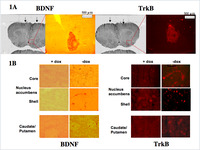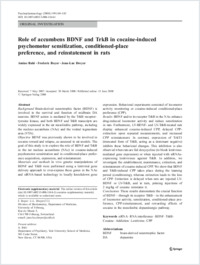Role of accumbens BDNF and TrkB in cocaine-induced psychomotor sensitization, conditioned-place preference, and reinstatement in rats
- Bahi, Amine Department of Psychiatry, Yale University School of Medicine, New Haven, USA
- Boyer, Frederic Division of Biochemistry, Department of Medicine, University of Fribourg,Switzerland
- Vijay, Chandrasekar Division of Biochemistry, Department of Medicine, University of Fribourg,Switzerland
- Dreyer, Jean-Luc Division of Biochemistry, Department of Medicine, University of Fribourg,Switzerland
-
13.06.2008
Published in:
- Psychopharmacology. - 2008, vol. 199, no. 2, p. 169-182
English
Background Brain-derived neurotrophic factor (BDNF) is involved in the survival and function of midbrain DA neurons. BDNF action is mediated by the TrkB receptor–tyrosine kinase, and both BDNF and TrkB transcripts are widely expressed in the rat mesolimbic pathway, including the nucleus accumbens (NAc) and the ventral tegmentum area (VTA). Objective BDNF was previously shown to be involved in cocaine reward and relapse, as assessed in rat models. The goal of this study is to explore the role of BDNF and TrkB in the rat nucleus accumbens (NAc) in cocaine-induced psychomotor sensitization and in conditioned-place preference acquisition, expression, and reinstatement. Materials and methods In vivo genetic manipulations of BDNF and TrkB were performed using a lentiviral gene delivery approach to over-express these genes in the NAc and siRNA-based technology to locally knockdown gene expression. Behavioral experiments consisted of locomotor activity monitoring or cocaine-induced conditioned-place preference (CPP). Results BDNF and/or its receptor TrkB in the NAc enhance drug-induced locomotor activity and induce sensitization in rats. Furthermore, LV-BDNF- and LV-TrkB-treated rats display enhanced cocaine-induced CPP, delayed CPP-extinction upon repeated measurements, and increased CPP reinstatement. In contrast, expression of TrkT1 (truncated form of TrkB, acting as a dominant negative) inhibits these behavioral changes. This inhibition is also observed when rats are fed doxycycline (to block lentivirus-mediated gene expression) or when injected with siRNAs-expressing lentiviruses against TrkB. In addition, we investigate the establishment, maintenance, extinction, and reinstatement of cocaine-induced CPP. We show that BDNF and TrkB-induced CPP takes place during the learning period (conditioning), whereas extinction leads to the loss of CPP. Extinction is delayed when rats are injected LV-BDNF or LV-TrkB, and in turn, priming injections of 2 mg/kg of cocaine reinstates it. Conclusions These results demonstrate the crucial function of BDNF—through its receptor TrkB—in the enhancement of locomotor activity, sensitization, conditioned-place preference, CPP-reinstatement, and rewarding effects of cocaine in the mesolimbic dopaminergic pathway
- Faculty
- Faculté des sciences et de médecine
- Department
- Département de Médecine
- Language
-
- English
- Classification
- Biological sciences
- License
- License undefined
- Identifiers
-
- RERO DOC 10560
- DOI 10.1007/s00213-008-1164-1
- Persistent URL
- https://folia.unifr.ch/unifr/documents/300861
Other files
Statistics
Document views: 182
File downloads:
- dreyer_rab_sm.TIF: 22
- Psychopharmacology_2008_.pdf: 261

